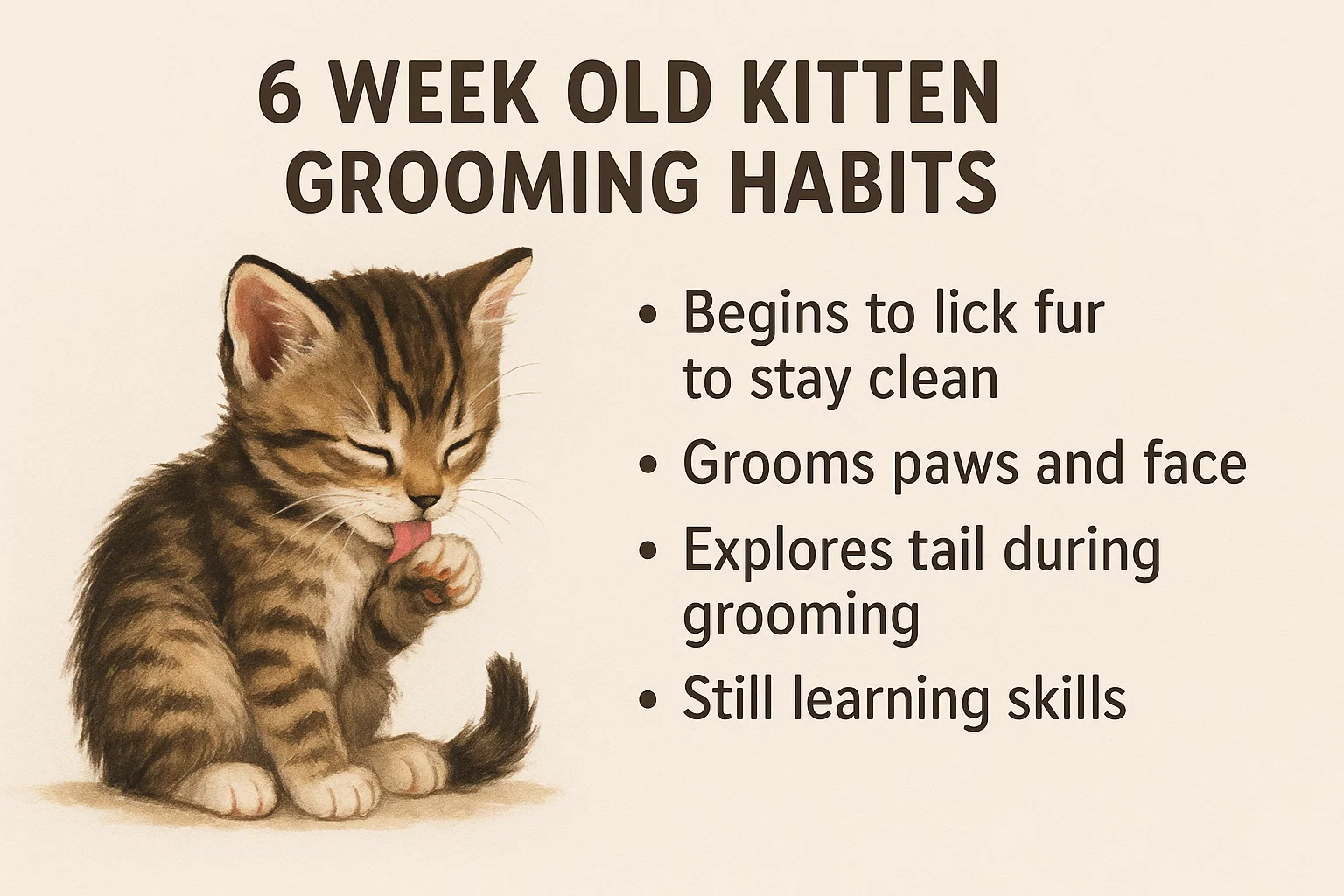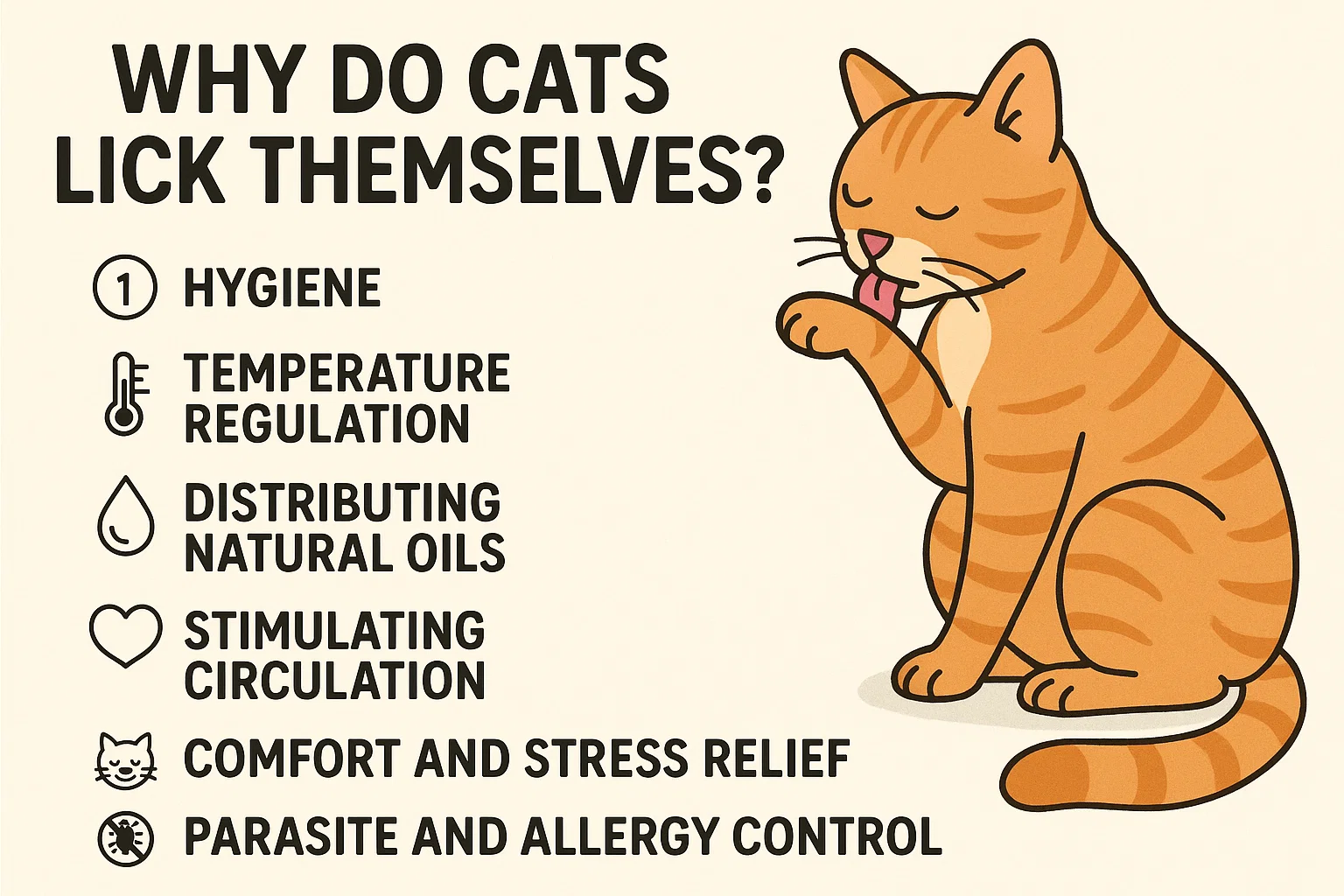When Do Kittens Start Grooming Themselves? A Complete Guide
Kittens are irresistibly cute, but they also need help staying clean—especially in their early weeks. As new pet parents, it’s common to wonder when kittens start grooming themselves, what grooming habits to expect from a 6-week-old kitten, and why cats spend so much time licking their fur.
Grooming is more than just looking good—it’s tied to your cat’s health, comfort, and emotional well-being. This article breaks down kitten grooming development and teaches you how to support your furry friend as they grow.
When Do Kittens Start Grooming Themselves?
Kittens typically begin grooming themselves between 4 to 6 weeks of age. At this stage, they also start grooming their littermates and mother. This behavior, called allogrooming, helps kittens bond and learn essential social and self-care skills.
Kittens learn by watching and mimicking their mother. She cleans them from birth to stimulate urination, feeding, and bonding. Gradually, the kittens pick up the behavior and start licking their paws, faces, and fur. By 8 weeks old, most kittens have grasped basic grooming habits and clean themselves regularly.
However, even as they begin self-grooming, young kittens might not do it thoroughly. They still benefit from help—whether from their mother, siblings, or you as their caregiver.
6 Week Old Kitten Grooming Habits

A 6 week old kitten is becoming more independent but still requires some assistance. At this age:
- They begin grooming themselves and each other.
- Litter box use becomes consistent.
- Socialization is crucial—grooming helps reinforce bonds among kittens.
- Nail trimming and brushing can be introduced gently with positive reinforcement.
Six-week-old kittens are full of energy. They run, play, and explore their surroundings. But while they begin grooming, it’s still not always thorough. They might miss areas or leave behind dirt and food particles. That’s where your support comes in—helping them stay clean while they learn proper hygiene.
How Should You Help a 6-Week-Old Kitten?
You can:
- Use a damp cloth to wipe off food or debris.
- Introduce a kitten-safe brush to prevent mats.
- Start trimming their claws carefully.
- Provide a clean, safe litter box and guide them to use it consistently.
Avoid bathing your kitten unless absolutely necessary. If needed, use warm water and a kitten-safe shampoo, and dry them gently.
Why Do Cats Lick Themselves?

If you’ve ever wondered why cats lick themselves, the answer goes beyond cleanliness. Cats are natural groomers, and licking is a multifunctional behavior.
Here are the main reasons cats lick themselves:
1. Hygiene
Cats use their barbed tongues to remove dirt, loose hair, and parasites from their fur. Their grooming ritual keeps their coat clean and healthy.
2. Temperature Regulation
Cats lick themselves to cool down. Saliva evaporates on the fur, helping regulate body temperature during warm weather.
3. Distributing Natural Oils
Their grooming spreads natural oils from their skin across their coat, keeping it shiny and waterproof.
4. Stimulating Circulation
Grooming helps increase blood flow through the skin, which supports healing and overall health.
5. Comfort and Stress Relief
Licking can soothe anxiety or embarrassment. Cats may groom after a stressful event to calm themselves—this is called displacement behavior.
6. Parasite and Allergy Control
Frequent grooming helps remove allergens and prevent fleas or mites from spreading.
How to Help a Kitten Learn Grooming
Even though grooming is instinctual, kittens may need encouragement—especially if they were separated from their mother too early. Here’s how you can support your kitten’s grooming development:
1. Start Young
Begin gentle brushing, nail trimming, and handling between 2 to 7 weeks old. This is the prime socialization window, and early exposure can reduce stress later in life.
2. Create a Routine
Make grooming part of a regular routine. Short, calm grooming sessions will help your kitten get used to being touched and handled.
3. Use the Right Tools
- Soft-bristled brush or grooming glove
- Kitten-safe shampoo (for emergencies)
- Nail trimmers and styptic powder
- Towels and non-slip mats for cleaning or bathing
- Treats to reinforce positive behavior
4. Watch for Under-Grooming or Over-Grooming
If your kitten isn’t grooming at all, it may signal a health issue. Watch for signs like:
- A greasy or unkempt coat
- Mats or tangles
- Food debris on the face
- Urine stains on the fur
On the other hand, excessive grooming could mean stress, skin irritation, or even medical issues. Talk to a vet if you notice bald spots, wounds, or constant licking.
Also Read: How To Clean a Cats Bum.
Final Thoughts
So, when do kittens start grooming themselves? Typically, between 4 to 6 weeks of age—though it takes time and support for them to become proficient. A 6 week old kitten will begin grooming behaviors but still needs your help with brushing, bathing, and nail care. And why do cats lick themselves? It’s not just about staying clean—it’s a crucial part of regulating temperature, spreading natural oils, and reducing stress.
With the right care and observation, your kitten will grow into a healthy, confident, and clean adult cat. Help them along by gently guiding their grooming habits and keeping a close eye on their development.







